The latest edition of DFA’s Household Finance Confidence Index to end August is released today, and it shows a significant fall. With a score of 87.69 (down from 91.1 in July), it is the lowest since the index started, and is well below its neutral setting, which was crossed in April 2014. Recent stock market volatility, concerns about employment prospects, rising living costs and slowing income growth all combine to drive the index lower.
The results are derived from our household surveys, averaged across Australia. We have 26,000 households in our sample at any one time. We include detailed questions covering various aspects of a household’s financial footprint. The index measures how households are feeling about their financial health.
To calculate the index we ask questions which cover a number of different dimensions. We start by asking households how confident they are feeling about their job security, whether their real income has risen or fallen in the past year, their view on their costs of living over the same period, whether they have increased their loans and other outstanding debts including credit cards and whether they are saving more than last year. Finally we ask about their overall change in net worth over the past 12 months – by net worth we mean net assets less outstanding debts.
Looking at the drivers of the index, this month, 40% of households are concerned about rising costs of living (up 1.8% on last month), whilst 52% said their costs had not changed (down 3.3%). In the surveys, recent council charges and school fees were mentioned specifically.
Turning to real income (after inflation), about 4% of households saw their income rise in real terms (up 0.3% on last month), whilst 39.6% said their incomes had fallen (down 0.5%) and 55% said there had been no change. Income from bank deposits continued to drop, thanks to lower rates, and dividends from some shares were lower than expected. A significant proportion did not expect to see any rise in wages in the next six months.
Looking at debt, 11.4% of households were more comfortable with their current levels of borrowing, (down 1.2% on last month), whilst 59% were about the same (up 1.85%), thanks to the expectation that interest rates were unlikely to rise any time soon. There was a rise of 0.5% in those feeling less comfortable about their level of debt, (27%), this was directly linked with concerns about future employment prospects.
Turning to savings, 13.5% of households were more comfortable with their level of savings (down 0.4% compared with last month), whilst 30.2% were less comfortable (a fall of 1.1%). 54% of households were feeling about the same as last month, up 1%.
Looking at job security, 13.8% of households felt more secure about their job prospects (down by 1.9% on last month), whilst 22% felt less secure (up 2.5%) and 61.5% felt as secure as last month (down 0.5%). There were significant state and industry variations, with those employed in mining and construction more concerned, especially in WA, along with those in manufacturing in VIC and SA, and those in QLD and NSW in resources. Those in the service sectors, such as healthcare and finance were more confident. Younger workers and those aged over 50 years were more concerned, whilst females were less concerned than males.
Finally, looking at net household worth, 60% of households thought their net worth had risen (down 2.2% on last month), thanks mainly to rising home values in the eastern states. 24.6% saw no change (up 1.5%) and 13.6% saw a fall. The main drivers of those with concerns can be traced to the volatility on the stock markets, and falling property values in WA. We also note that the one third of households who are not property active are significantly more represented in the falling category, because they do not benefit from the wealth effect of rising property prices.
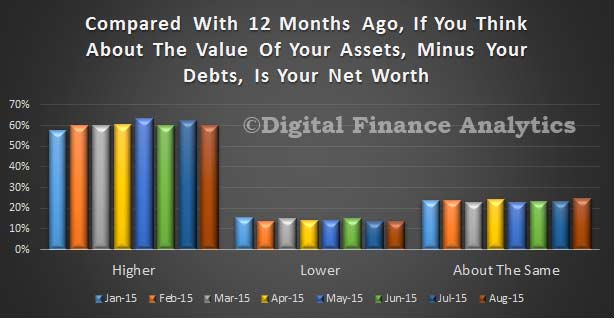 Overall then household financial confidence continues to languish, despite record low interest rates. Because of this we believe many households will continue to spend carefully, and be careful not to extend their high personal debt further. We did also note though a strong interest in property as the most secure investment option, and as a result, we expect to see ongoing high demand. We will cover this in more detail in a future post.
Overall then household financial confidence continues to languish, despite record low interest rates. Because of this we believe many households will continue to spend carefully, and be careful not to extend their high personal debt further. We did also note though a strong interest in property as the most secure investment option, and as a result, we expect to see ongoing high demand. We will cover this in more detail in a future post.

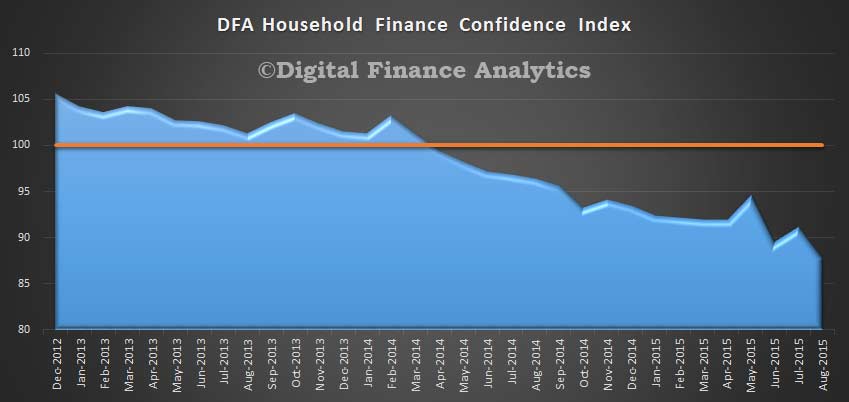
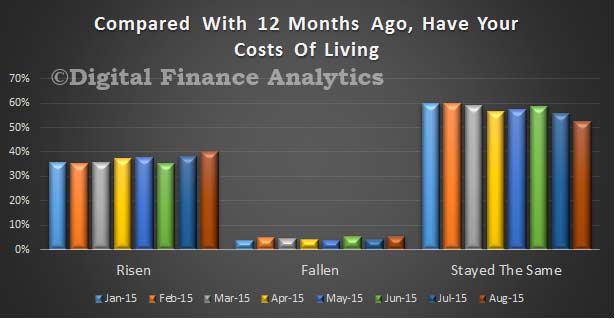
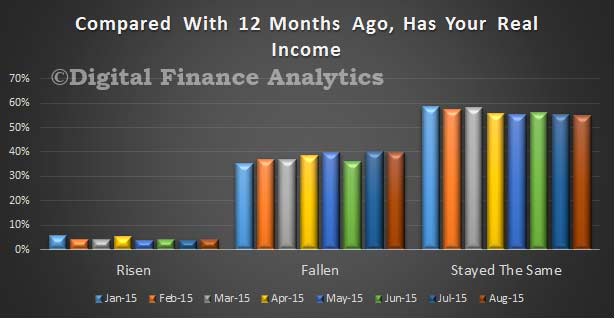
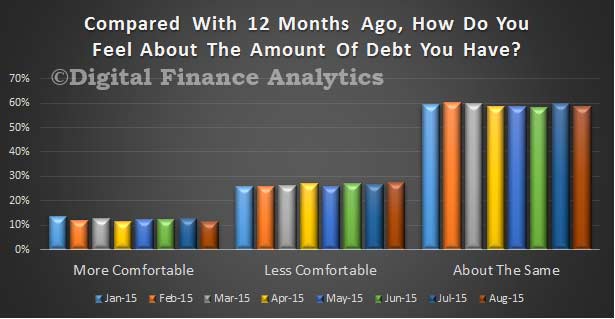
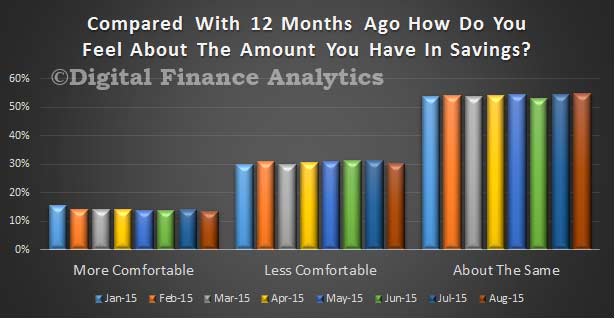

One thought on “Latest DFA Survey Shows Household Finance Confidence Falls”